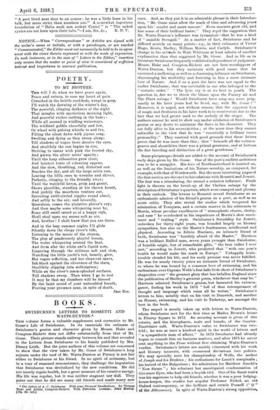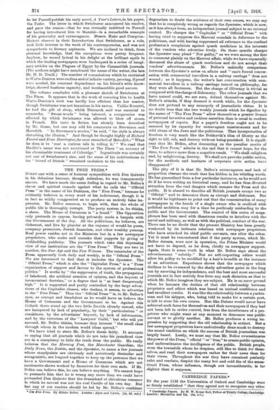BOOKS.
SWINBURNE'S LETTERS TO ROSSETTI AND WATTS-DUNTON.$ Tnts volume forms a valuable supplement and corrective to Mr. Cosse's Life of Swinburne. In its essentials the estimate of Swinburne's genius and character given by Messrs. Hake and Compton-Rickett does not differ substantially from that of Mr. Goose. Their picture stands midway between his and that revealed in the Letters from Swinburne to his family published by Mrs. Disney Leith. But the joint-authors of this volume are concerned to show that the view taken by Mr. Gosse of Swinburne's long sojourn under the roof of Mr. Watts-Dunton at Putney is not fair either to Swinburne or his friend. In no spirit of acrimony, but in a tone of reasoned remonstrance, they challenge the imputation that Swinburne was devitalized by the new conditions. He did not merely regain health, but a great measure of his creative energy. His life was regular, but it was neither stagnant nor dull. They point out that he did see many old friends and made many new
* The Letters of A. C. Swinburne. With 101111C Personal Reeolleettons. By Thomas Hake aml Arthur Compton-lilekett, With Portraits. 1,91kdon: John XurraY- Mi. est. :iota ones. And, as they put it in an admirable phrase in their Introduc. tion, " Mr. Geese must allow the mark of time and advancing years upon his ` scarlet and azure macaw.' Even macaws grow old, and lose some of their brilliant lustre." They repel the suggestion that Mr. Watts-Dunton's influence was tyrannical—that he was a kind of "amiable Svengali." As a matter of fact, Swinburne and he differed acutely on many points--e.g., in their estimates of Victor Hugo, Keats, Shelley, William Morris, and Carlyle. Swinburne's change in his attitude to Walt Whitman at least admits of another explanation than that suggested by Mr. Gosse. And in life as in literature Swinburne frequently exhibited independence of judgment. Messrs. Hake and Compton-Rickett are not hero-worshippers of Watts-Dunton, but they maintain with good cause that he exercised a mellowing as well as a chastening influence on Swinburne, discouraging his morbidity and fostering in him a more intimate love of Nature. And if as a poet the later was not equal to the earlier Swinburne, that was inevitable in one who belonged to the "ecstatic order." " The lyric cry is at its best in youth. The question is, Are we to throw the blame upon the Putney air and The Pines menage I Would Swinburne have sung any more poig- nantly in his later years had he lived, say, with Mr. Gone ? " Moreover, it is urged, not without reason, that the apparent loss of magic and freshness in his later work is to some extent due to the fact that we had grown used to the melody of the singer. The authors cannot be said to show any undue adulation of Swinburne's genius or any desire to minimize the flaws in his character. They are fully alive to his eccentricities ; at the same time they cannot subscribe to the view that he was "essentially a brilliant rococo personality." They contend with good grounds that these letters prove that he was more than this ; that "beneath all the extrava- gances and absurdities there was a primal greatness, and at bottom the fine breeding and distinction of a great gentleman."
Some picturesque details are added to the account of Swinburne's early days given by Mr. Geese. One of the poet's earliest ambitions was to be a smuggler. His love of Northumberland is insisted on, as well as the limitations of his Nature-worship, as compared, for example, with that of Wordsworth. But the most interesting pages of the first section are devoted to his relations with Rossetti and Jowett. The first was a stimulating, the second a sedative influence. Fresh light is thrown on the break-up of the Chelsea menage by the description of Swinburne's quarters, which were cramped and gloomy in their outlook. The letters to Rossetti reveal Swinburne as an enthusiastic admirer of his friend's genius as a poet, as well as an acute critic. They also reveal the malice which tempered his admiration of Tennyson, and a certain reserve in his references to Morris, whose peculiar excellences of "atmospheric charm, clarity, and ease" he overlooked in his impatience of Morris's slow move- ment and " trailing " style. Swinburne's friendship for Jowett, unbroken for thirty-eight years, was founded largely on literary sympathies, but also on the Master's fearlessness, intellectual and physical. According to Edwin Harrison, an intimate friend of both, Swinburne was "horribly afraid of the Master." Harrison was a brilliant Balliol man, seven years younger than Swinburne, of humble origin, but of remarkable gifts, " the best talker I ever met," according to Jowett, who predicted that "with one year's health he would make his mark in Europe." Unhappily brain- trouble clouded his life, and his early promise was never fulfilled. He was for nearly twenty years an intimate friend of Swinburne, to whom he was bound by a common love of swimming, and his enthusiasm over Captain Webb's feat falls little short of Swinburne's rhapsodies over" the greatest glory that has befallen England since the publication of Shelley's greatest poem, whichever that may be." Harrison admired Swinburne's genius, but lamented his extrava- gance, finding his work in 1875 "full of that intemperance of thought and language which ruins all he writes." Swinburne's letters to him, notably that on his visit to Dunwich, and another on Homer, swimming, and his visit to Trelawny, are amongst the best in the book.
The sequel is mostly taken up with letters to Watte-Dunton, whom Swinburne met for the first time at Madox Brown's house in Fitzroy Square in 1872. An amusing account is given of this coterie, and the hierophante, male and female, of the Gautier- Baudelaire cult. Watts-Dunton's value to Swinburne was two- fold ; he was at once a kindred spirit in the world of letters and "a sympathetic man of affairs." In 1873 Swinburne had already begun to consult him on business matters, and after 1875 he never sent anything to the Press without first obtaining Watte-Dunton's verdict. Swinburne's letters are mainly concerned with his work and literary interests, with occasional deviations into politics. We may specially note his championship of Wells, the author of Joseph and his Brethren ; his enthusiasm for Lamb's marginalia ; his hatred of the Bulgarians ; his admiration for Matthew Arnold's "New Sirens " ; his reluctant but unmitigated condemnation of Governor Eyre, who had been a boyish idol. One of his finest traits was his eagerness to help old friends, whether it was a poor lodging- house-keeper, the erudite but angular Professor Nichol, an old Oxford contemporary, or the brilliant and erratic Purnell (" Q" of the Athettazuni). In spite of Watte-Dunton's strong opposition,
he let Purnell publish his early novel, A Year's Letters,in his paper, the Tatter. The letter in which Swinburne announced his resolve, and gave the reason—that he was eternally indebted to Punaell for having Introduced him to Mazzini—is a remarkable example of his generosity and extravagance. Messrs. Hake and Compton- Rickett observe in their Introduction that Swinburne, as a rule, took little interest in the work of his contemporaries, and was not sympathetic to literary aspirants. We are inclined to think, from personal knowledge, that the exceptions were pretty frequent. Anyhow, he waxed lyrical in his delight at the brilliant squib in which the leading newspapers were burlesqued in a series of imagi- nary articles on the Plagues of Egypt by the Canaanitish journals. (The authors might have mentioned the name of the writer, the late Mr. H. D. Trail.) The number of commissions which he entrusted to Watts-Dunton were endless and of infinite variety, proving, if proof were needed, his constant dependence on his friend's wide know- ledge, shrewd business capacity, and inexhaustible good nature.
The volume concludes with a pleasant sketch of Swinburne at The Pines. It appears that in the work of restoring him to health Watts-Dunton's cook was hardly less efficient than her master, though Swinburne was not luxurious in his tastes. Unlike Rossetti, he had the gift of sleep, which Bismarck said was essential to monarchs. " Swear-words " being tabooed, a compromise was effected by which Swinburne was allowed to blow off steam in French. His taste in fiction has already been described by Mr. Gosse, but one may add his comments on Stevenson and Meredith. "In Stevenson's stories," he said, "the style is always disturbing the illusion." And though he thought highly of Richard leveret and Evan Harrington, he once remarked of Meredith "What he does is to mar a curious tale in telling it.'" We read that Hazlitt's name was not mentioned at The Pines "on account of hie abominable treatment of Coleridge." Ingratitude was certainly not one of Swinbume's sins, and the sense of his indebtedness to Ins" friend of friends" remained unshaken to the end.



























 Previous page
Previous page